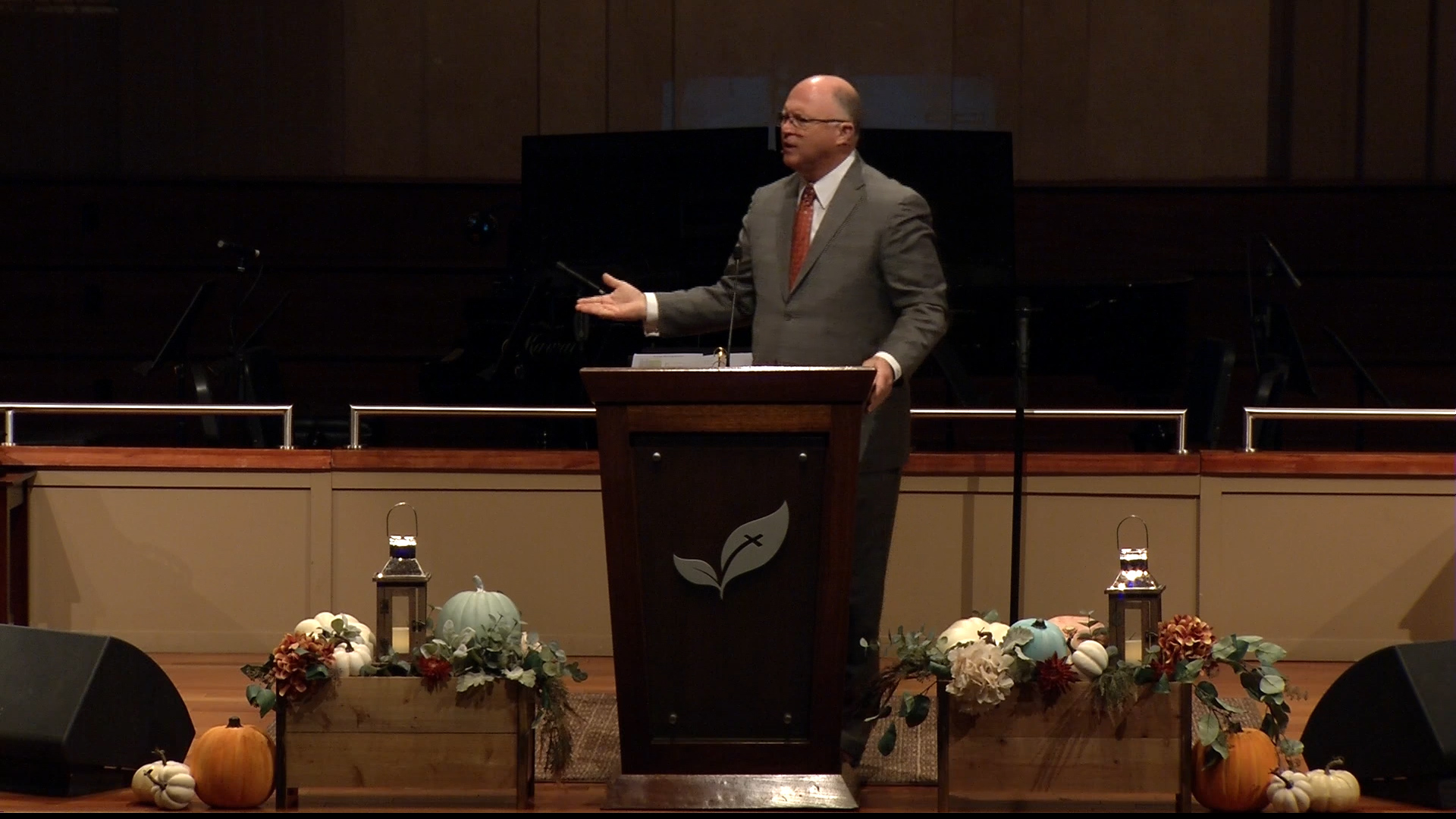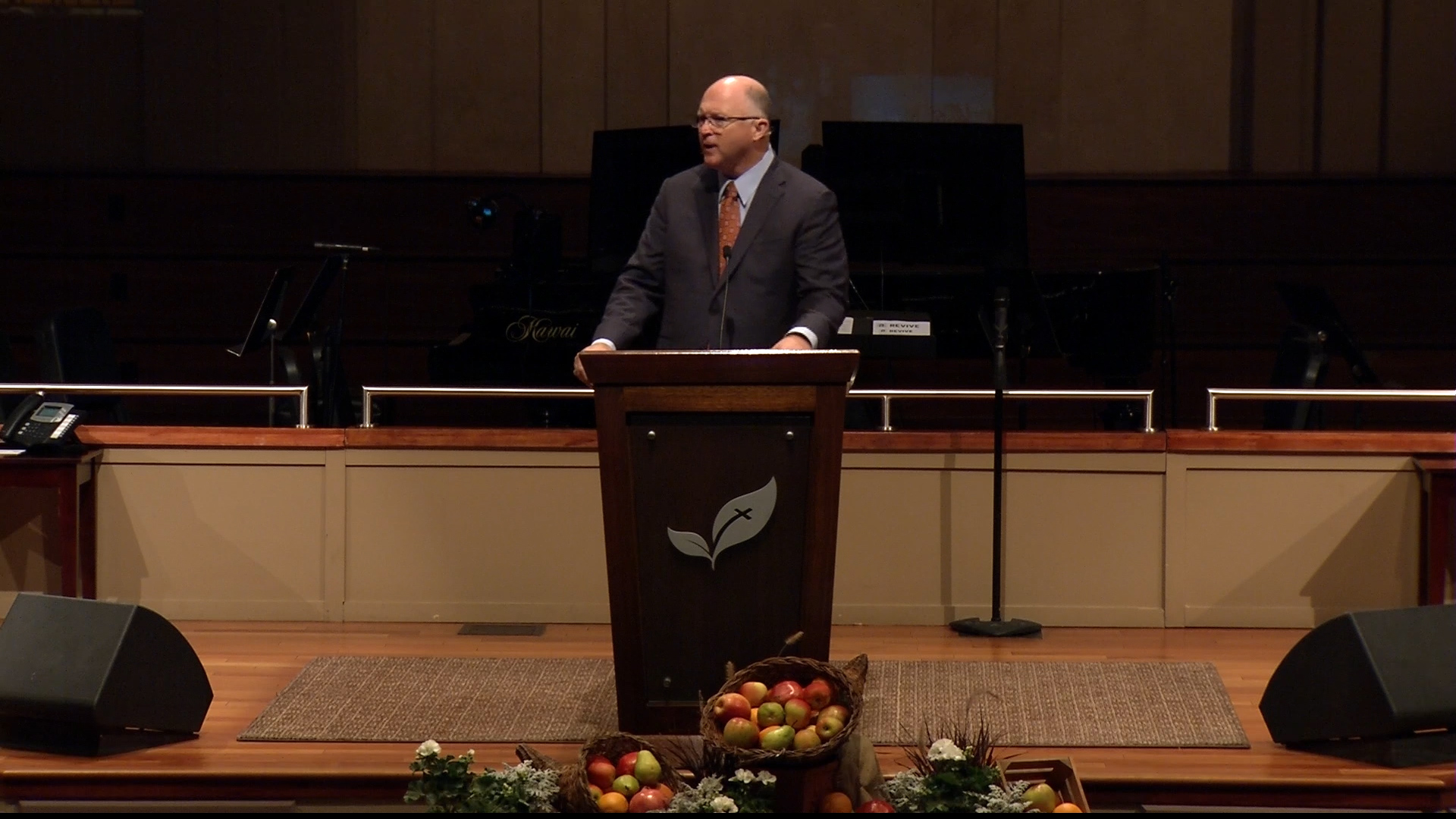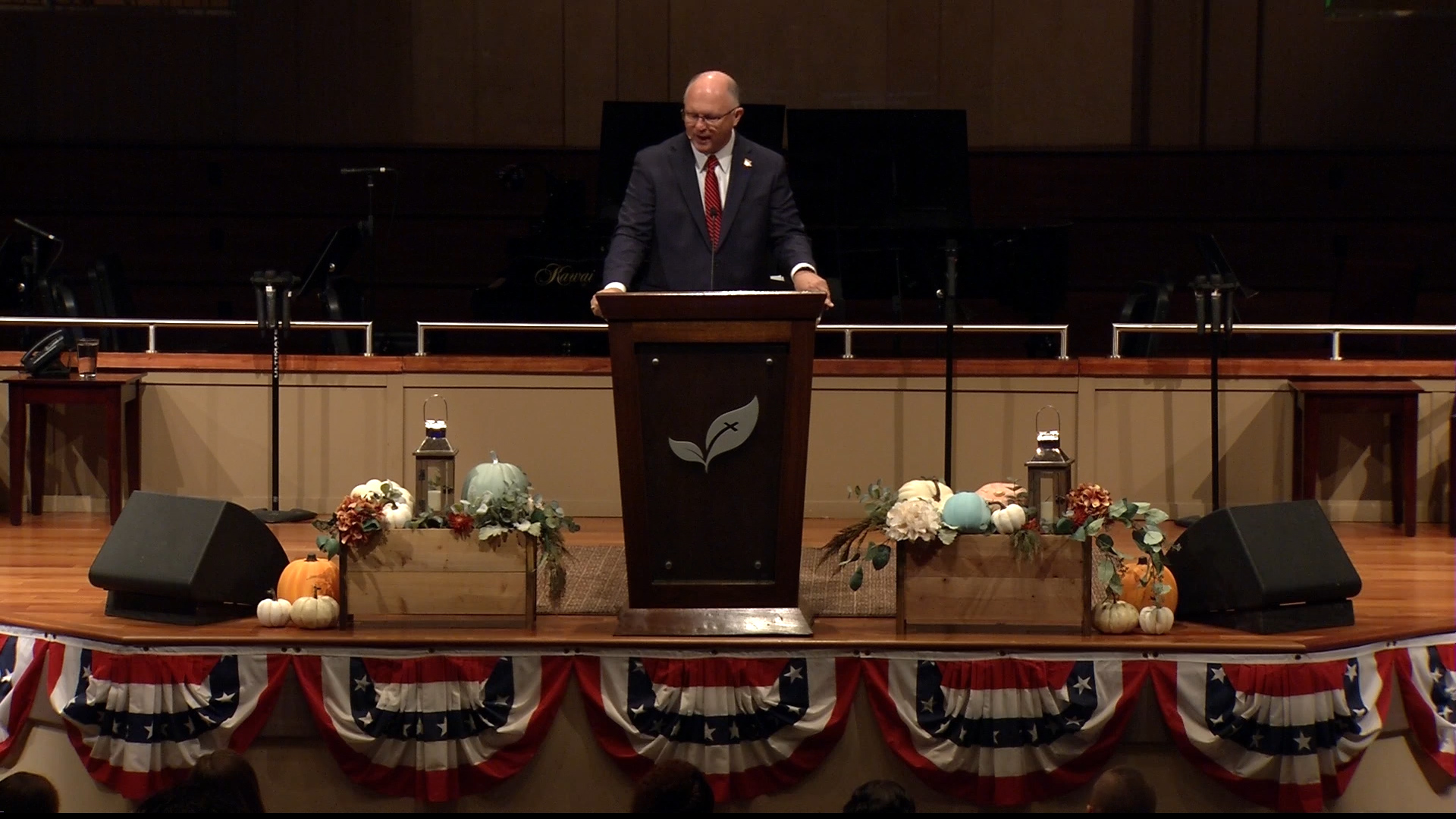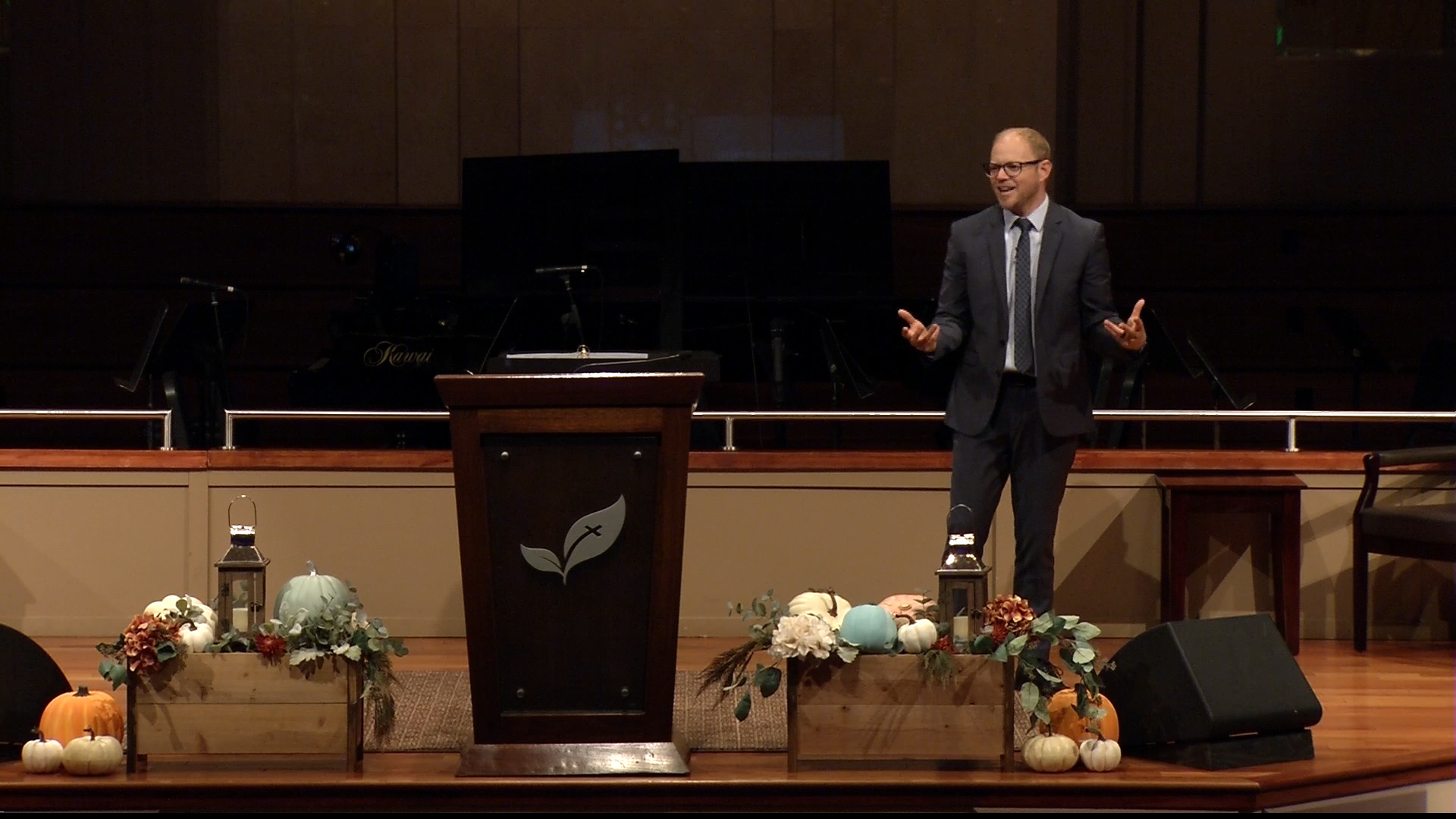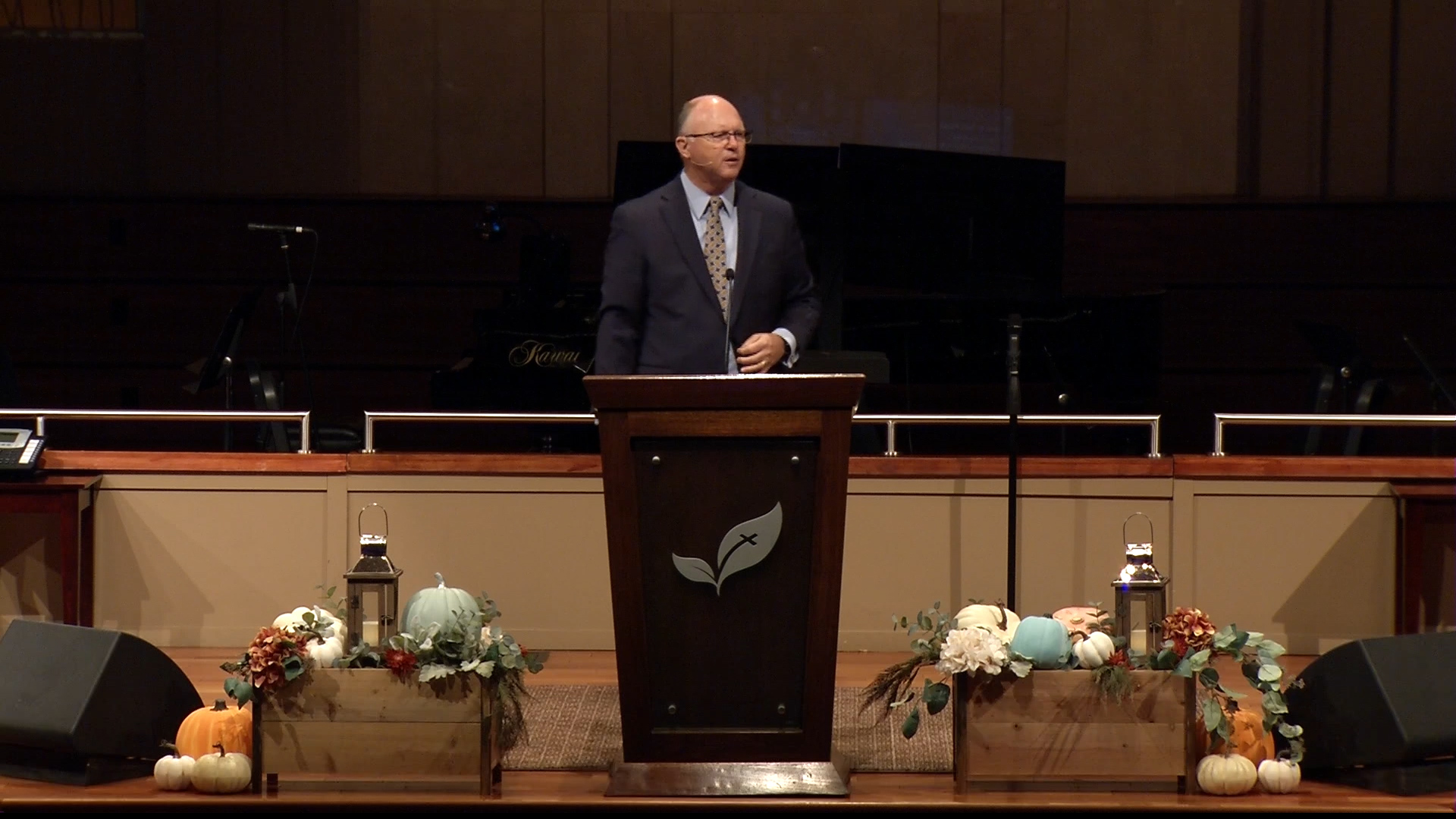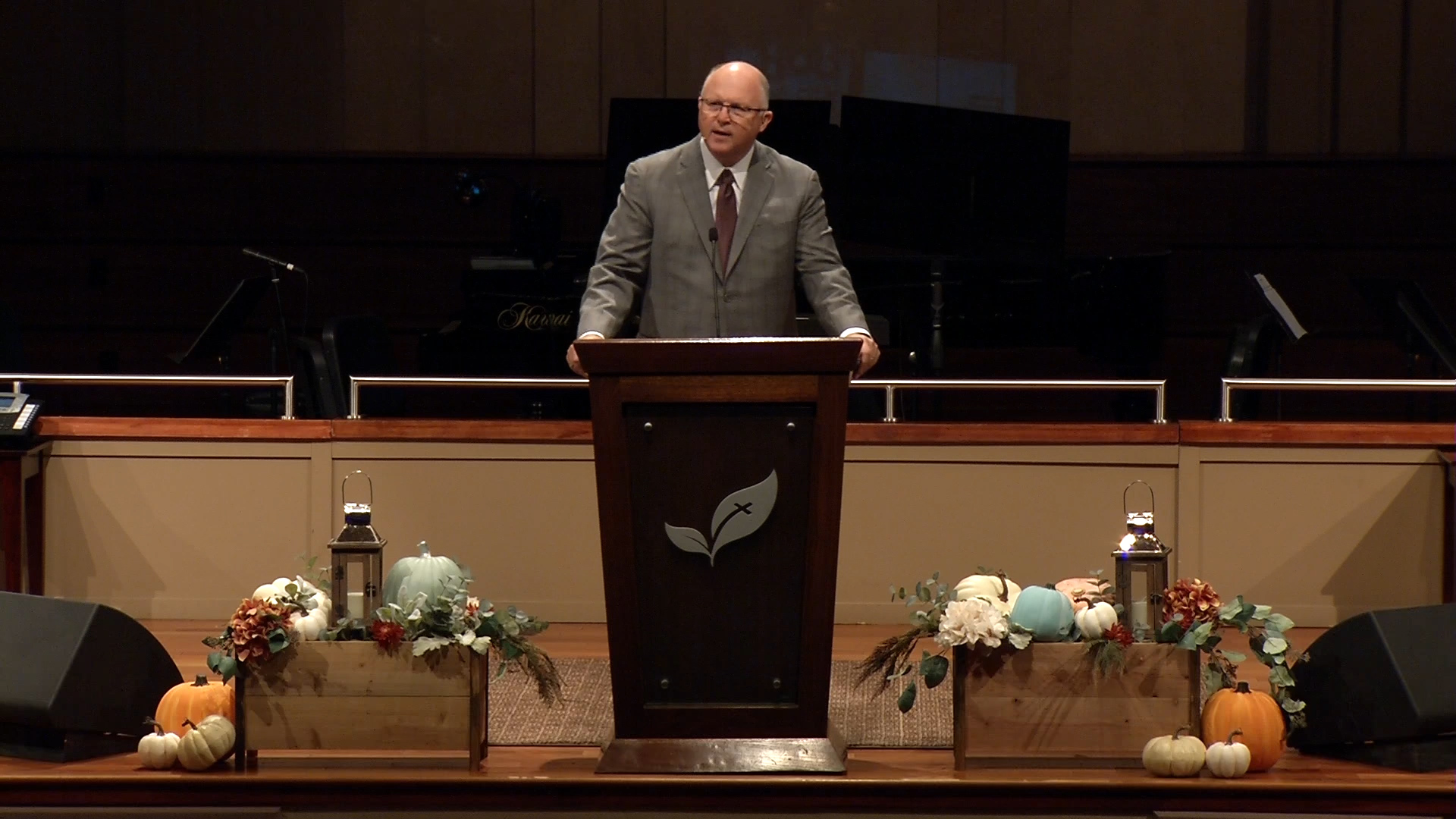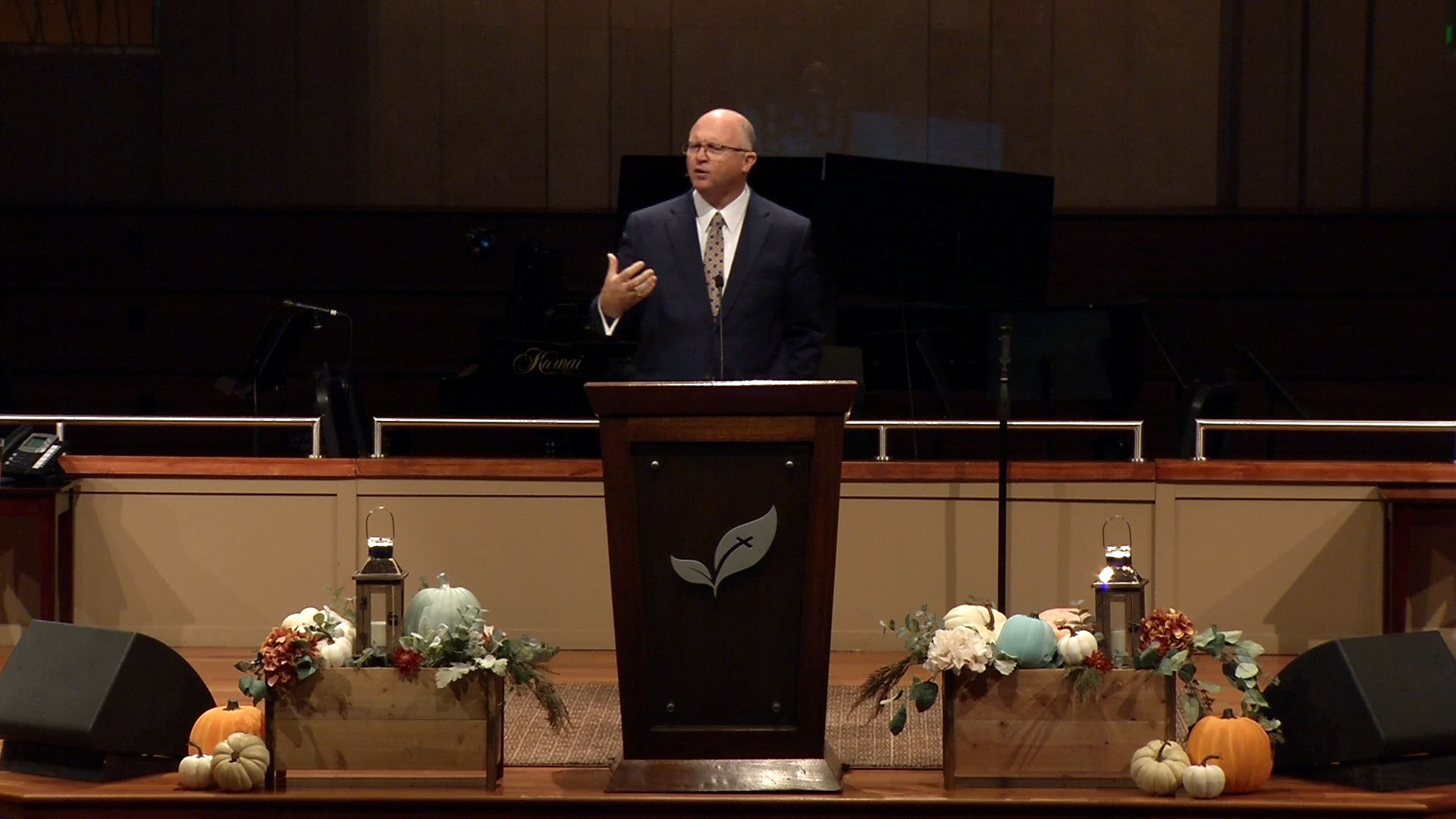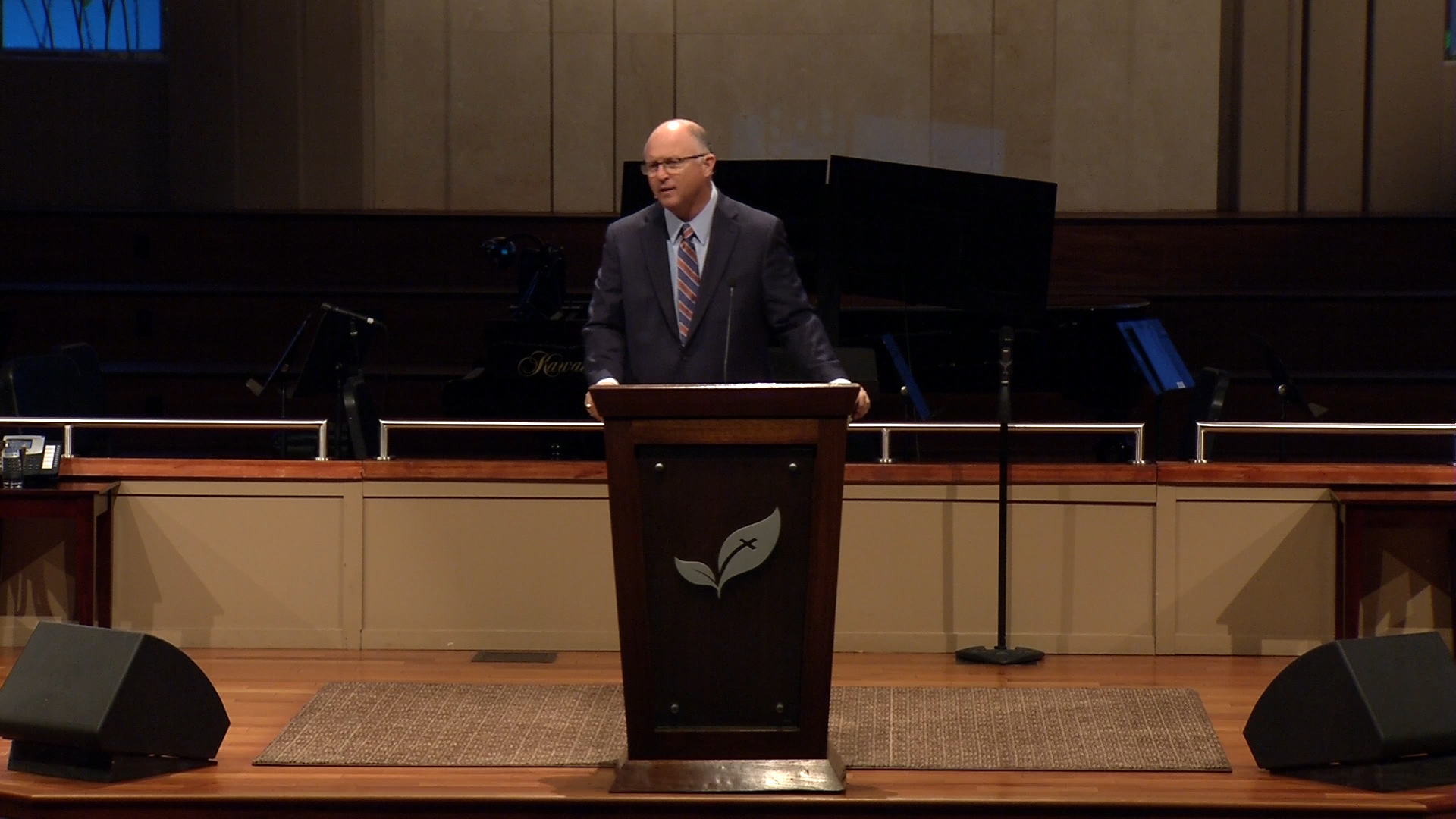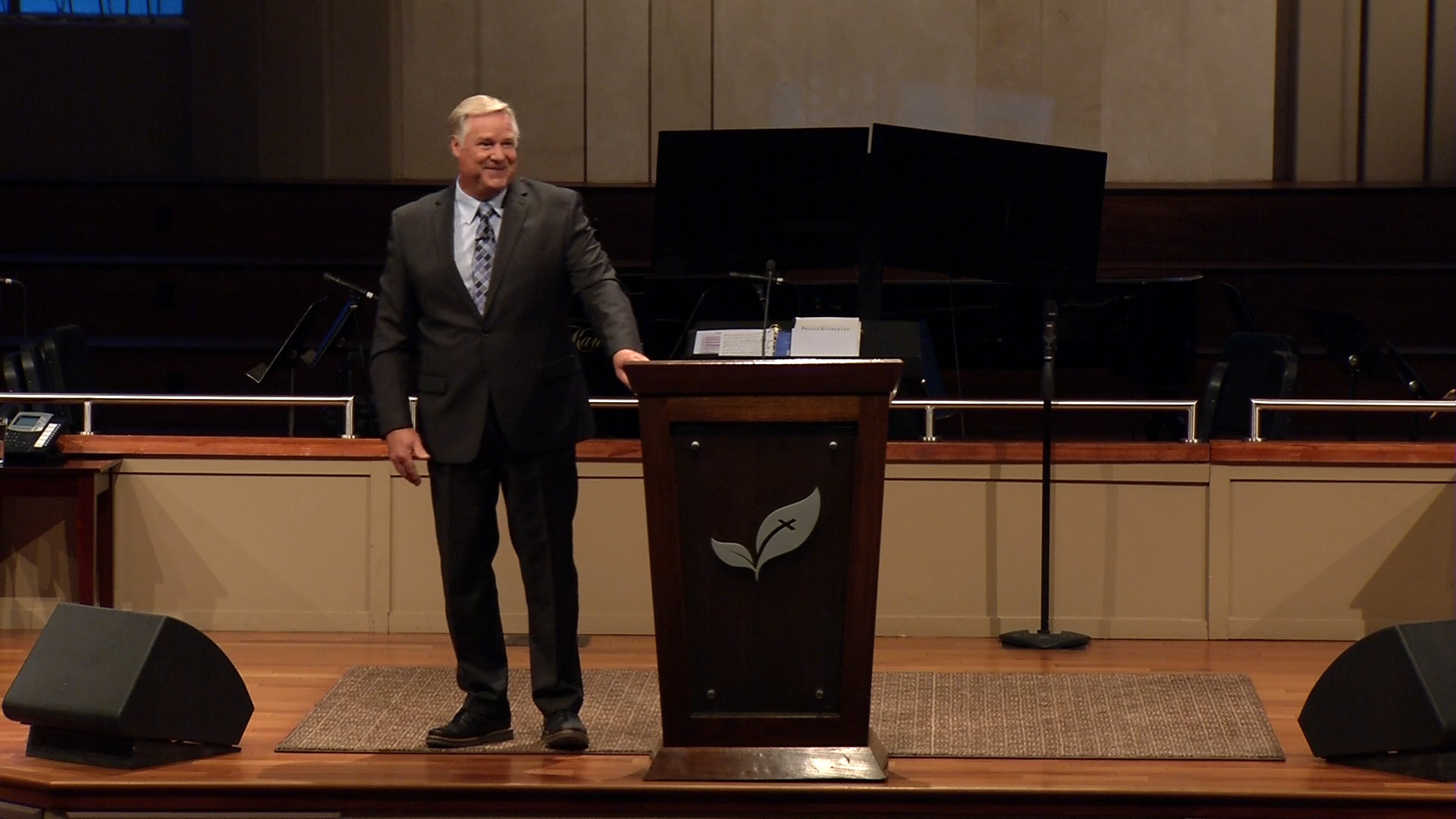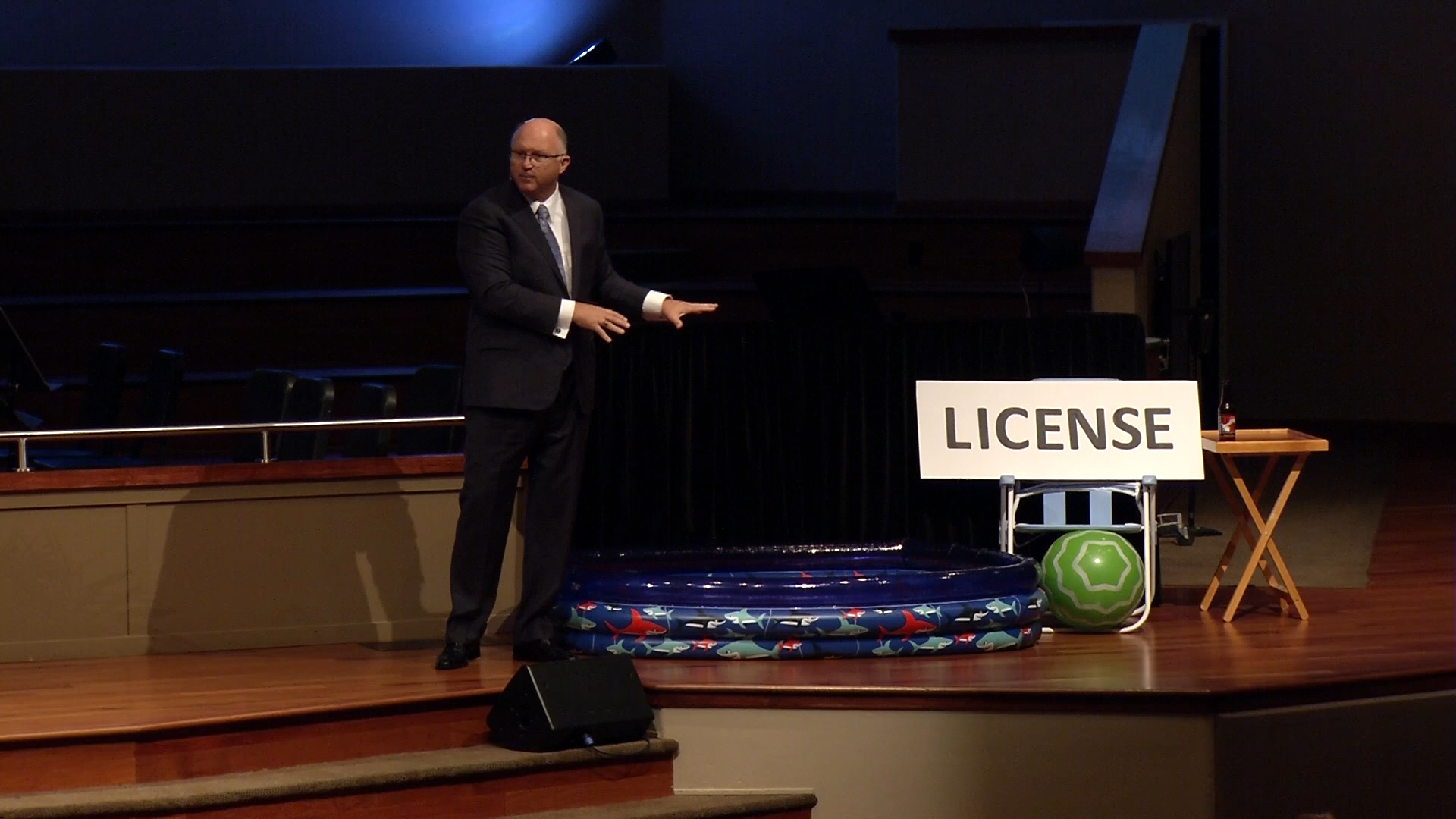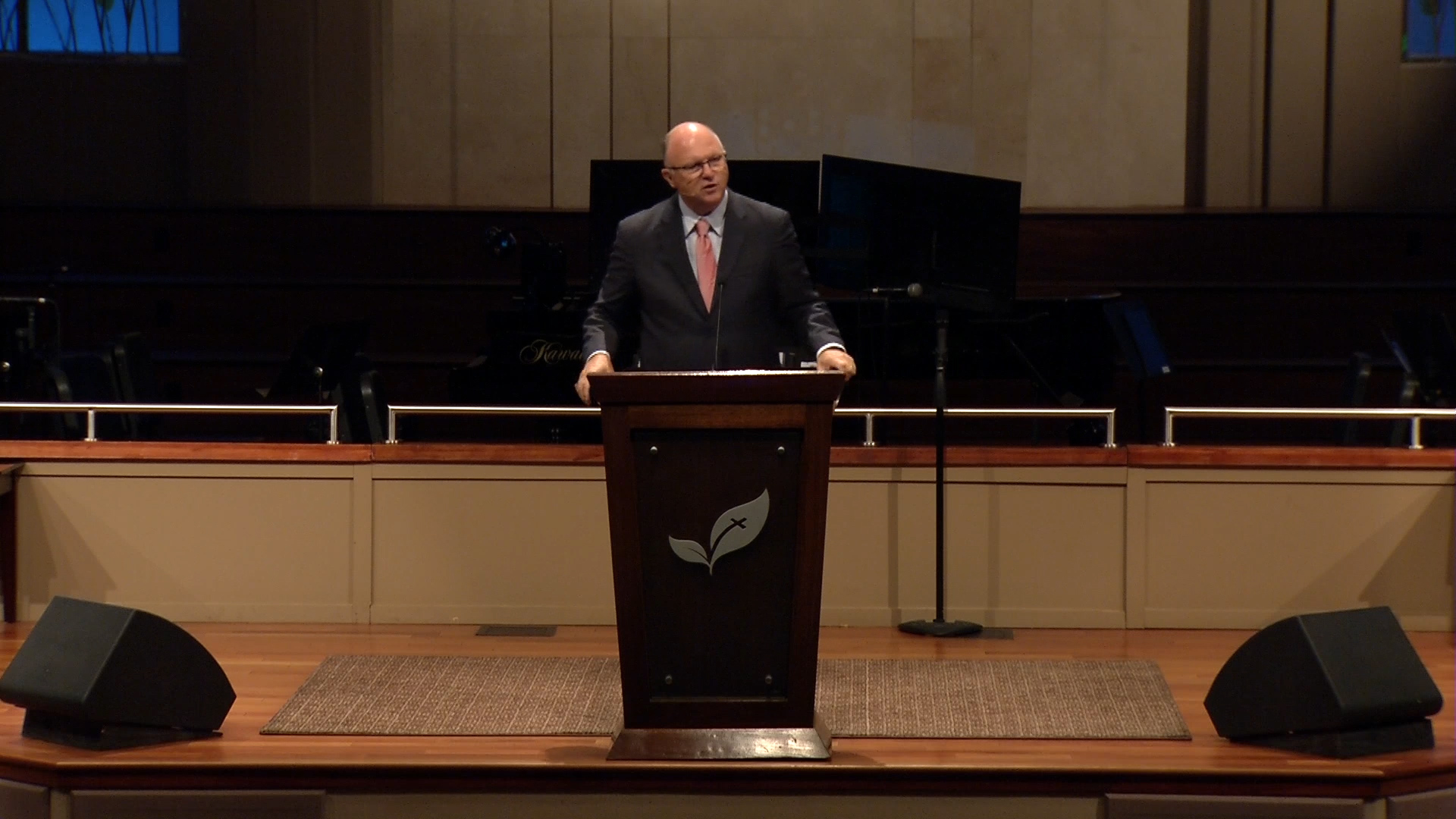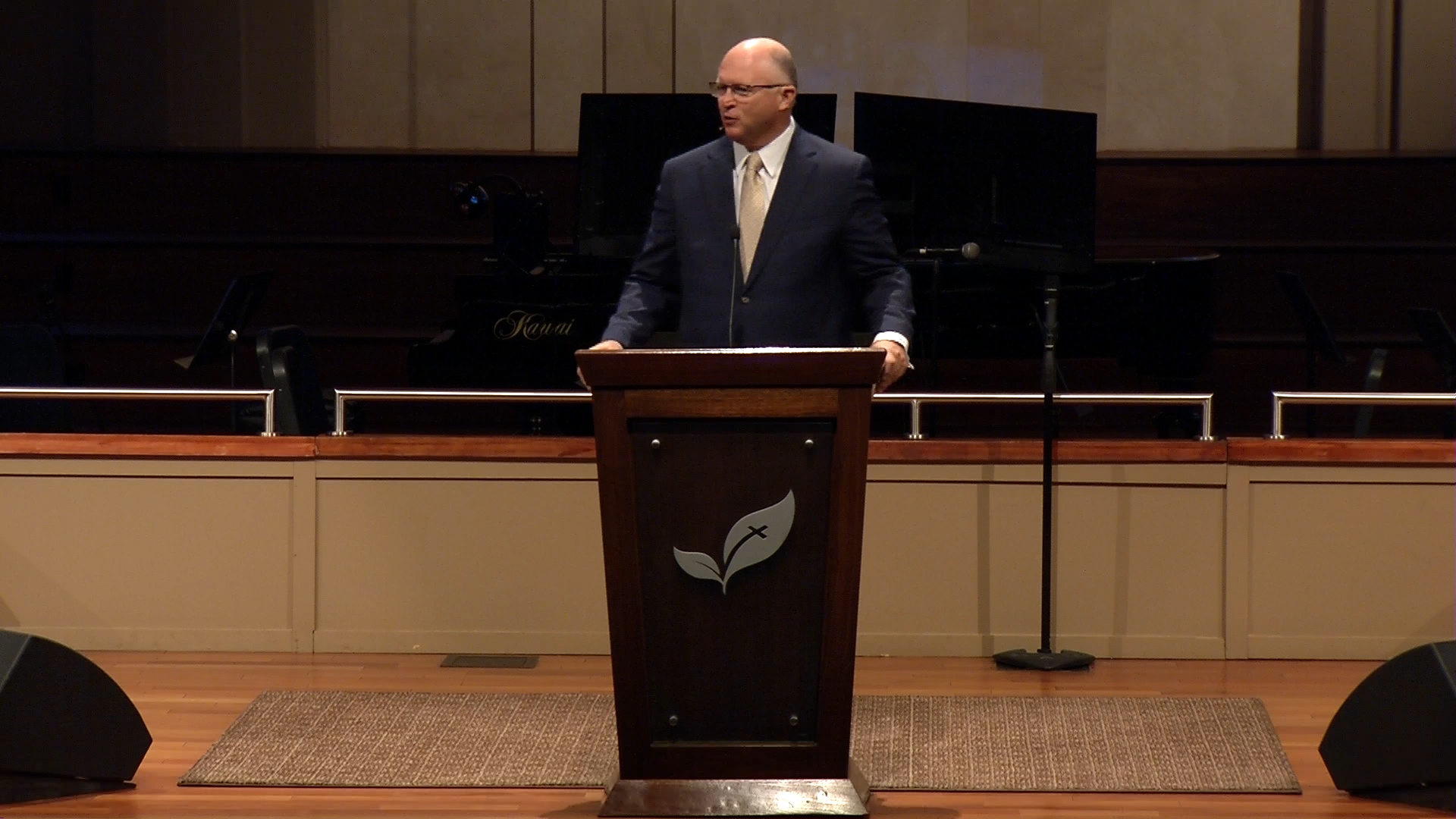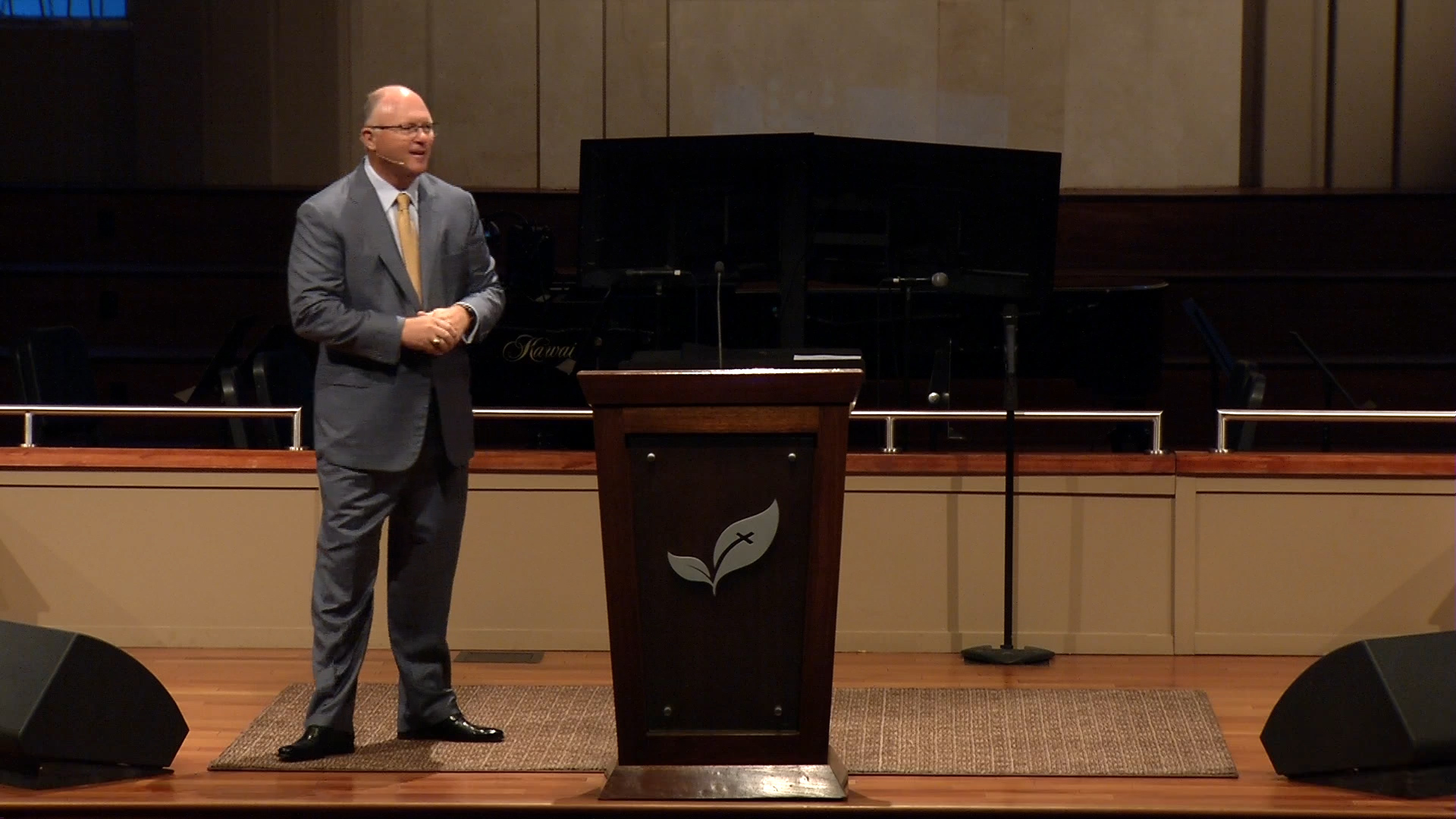Take your Bibles this morning, please, and turn to the book of Ephesians chapter 4, Ephesians chapter 4. If you're a guest with us, we're preaching a series of messages on the "one anothers" in the Bible. What does the Bible say about treating one another? How do we get along in our family life, in our workplace, in church? What does the Bible say about one another? So Ephesians chapter 4. Let's stand together, and we're going to read beginning in verse 25. Ephesians 4:25.
And we have a very special service planned tonight, and I want to encourage everyone to be here for it. I'm going to be sharing a brief update by way of slides regarding some of the things God is doing in Eastern Europe. And then we're going to bring a very special message that really relates to what this week is all about, and how Jesus taught us in the Gospels that working together we can achieve more for the Lord. And so, tonight is a special time, I'm excited about it; but I'm looking forward to this message right now as we come to the subject "Being Kind One to Another."
How many of you like it when your kids are kind to one another? Let me see. How many of you would say, "Sometimes we want our kids to do what we don't always do," right? And so we're going to learn, "What does it mean to be kind one to another?" Ephesians 4:25, and we'll read down through verse 32.
"Wherefore putting away lying, speak every man truth with his neighbour: for we are members one of another. Be ye angry, and sin not: let not the sun go down upon your wrath: neither give place to the devil. Let him that stole steal no more: but rather let him labour, working with his hands the thing which is good, that he may have to give to him that needeth. Let no corrupt communication proceed out of your mouth, but that which is good to the use of edifying, that it may minister grace unto the hearers. And grieve not the Holy Spirit of God, whereby ye are sealed unto the day of redemption. Let all bitterness, and wrath, and anger, and clamour, and evil speaking, be put away from you, with all malice: and be ye kind one to another, tenderhearted, forgiving one another, even as God for Christ's sake hath forgiven you."
Now next Sunday I'm going to preach on the subject "Forgiving One Another," and we're going to learn then God for Christ's sake hath forgiven us. And this is going to be a powerful message. You will be glad that you were here and that you brought a friend. But today we're going to learn about the first part of this verse which tells us, "Be ye kind one to another." So let's pray and we'll dive into this text.
Father, thank you for the wonderful crowd today. Thank you for individual hearts and lives open to the Bible. And, Lord, we live in an angry day, we live in a divisive day, and we need you to help us to be different, different in our marriages, different in our relationships. So teach us and help us, I pray in Jesus' name. Amen. You may be seated.
If you were to come to my office to seek counseling for your marriage, perhaps for a relationship that had been broken, nine times out of ten I'm going to open up the verses that I just read to you. These verses contain so much wisdom to help us in our relationships. And I believe now more than ever we need help, because we live in a very angry society.
If you watch the news at all it seems that today people can't disagree and still be kind one to another. They have to stand up and shout at one another. They have to wear t-shirts with vulgarity. They curse and swear. It seems that America has become somewhat more of an angry society in which to live.
A University of Texas study surveyed more than 16,000 people from 37 different cultures to ask them about, "What is a good relationship?" And they asked specifically, "What is the most desirable quality in a spouse?" For both men and women, the both desirable quality was stated to be kindness. One author said, "Kindness is a language that deaf people can hear and that blind people can see." Kindness. Everyone needs kindness.
A research study in 2016 found that fifty-three percent of Americans have quit buying from a company because the employees of that company were unkind to them. Thirty-four percent experienced regular incivility at work. In other words, people are not kind at work as they should be. Twenty-five percent of Americans, according to a study, also have experienced incivility or cyber bullying online, which is almost triple that from 2011.
Another 2016 study found that seventy-four percent of Americans believe that manners and civil behavior have deteriorated in the USA over the past decade. The study also found that one-quarter of Americans use extreme crude profanity on a daily basis. According 2018 poll, thirty-one percent of Americans think that it is likely that we will have a civil war within the next five years. Isn't that an amazing thought?
But people watching and seeing the divide in our culture and listening to the rhetoric on various sides of the culture might say what I've been saying for a while: "America is either headed for anarchy or revival. But we must pray for revival today." A lot of anger in our culture today.
Now I want you to study with me this morning this subject of being kind one to another. Why don't we see more kindness? Why is it that even Christians sometimes are angry, and sometimes there's cursing and grabbing of someone, and speaking unkindly to a child? Why do we hear of those reports today?
Well, I want you to notice this morning that there is a great conflict with kindness; there's a spiritual battle that's always going on. And there's a conflict with kindness, namely in the word "anger." It is a conflict of anger.
The Bible says in verse 26 these words: "Be ye angry, and sin not: let not the sun go down upon your wrath." Now I recognize that sometimes anger can be a righteous indignation. Sometimes there can be a righteous anger. This is what is referred to when it says, "Be ye angry, and sin not."
You see, even Jesus at times had a righteous indignation for things that he saw being done improperly. We think of the temple changers and John 2:14-16, and he said to those in verse 16 that sold the doves, "Take these things hence; make not my Father's house a house of merchandise." He took a scourge and he drove the money changers out of the temple in an act of righteous indignation.
The thing about Jesus, however, was that he was always perfectly angry at the sin, but not angry at the person. And herein lies the difference. Righteous indignation can be shown towards a problem. We might hear about the sin of abortion, and there is something within us that is righteously indignant. We might even hear about some sins of some type of discrimination or fraud, and we might become indignant or so concerned about the fact that this took place. But God says we're not to let the sun go down upon our wrath, and we're not to be angry at a person. You see, righteous indignation is angry at a problem; but it is never right to be angry at a person.
And so we see there is a conflict with kindness, and it is anger; and it is not normally a righteous anger, it is, in fact, a sinful anger. And anger always leads to sin. Notice it says in verse 26 these words: "Let not the sun go down upon your wrath."
You see, normally when someone becomes angry, there will be a sin accompanying that anger. I'm told by police officers that the number one reason for calls that they respond to is normally alcohol or drug-related, and the number two reason is anger-related, because anger can be temporary insanity. I mean, someone gets so angry they're not thinking correctly. In fact, we always should remember that there's only one letter difference between anger and danger, because anger will lead to sin, and sinful actions will ensue. Now righteous indignation is one thing, but so oftentimes those of us who find ourselves angry at a person are on the path to a sinful action. And this self-centeredness develops and shows forth its way in a way that harms the testimony of Jesus Christ.
Now look in your notes at James 1:19. It says, "Wherefore, my beloved brethren, let every man be swift to hear, slow to speak, slow to wrath." Now let's just think about this for a moment. We're to be swift to hear.
Let's take a little test this morning. How many ears do you have? Two, very smart church, all right. How about how many mouths do you have? One. God made us that way, didn't he? He says, "I want you to be swift to hear."
Now sometimes I don't do as well on that. Maybe some of you men are like this. My wife has a way of explaining things to me. I'm one of these guys that I'm listening, I'm listening, so that I can get to the bottom line and fix something, right? That's how I listen, I'm listening.
But my wife has a way of explaining things that is sometimes detail-orientated. Terrie will explain. Maybe it has to do with something going on with the grandkids or an upcoming birthday party or something she's planned, and she wants to talk through that in a certain way. And sometimes I'm too quick to try to solve the problem, and normally wrong in my assumption, because I've not listened to the wisdom that she wants to share. And what I need to remember is God gave me two ears for a reason. How many of you would say, "I could probably be a better listener too," all right?
So God says, "I want you to be swift to hear." But then notice he says, "I want you to be slow to speak." Now the problem with anger is we want to speak very quickly. We want to give someone a piece of our mind. Even though we can't spare it, we want to give it to them anyway. God says, "Be slow to speak."
And then he says, "Be slow to wrath." Now notice this: "For the wrath of man worketh not the righteousness of God." You see, when you get mad, when you begin to say things, when you begin to do things, that's not the righteousness of God; that's normally the carnality of man. And so, God says anger leads toward even more sin. Benjamin Franklin said it this way: "Whatever is begun in anger end in shame." So there's a conflict that we have concerning kindness, and the conflict is with the anger that comes up into our heart.
Now this conflict of anger leads, secondly, to a corruption of testimony, a corruption of testimony. Now the Bible says here in verse 26, "Be ye angry, and sin not: let not the sun go down upon your wrath." The longer that you hold anger, the longer that you sleep on your wrath, the more you are going to hurt your testimony, because you will develop a bitter spirit, a cankered outlook.
Now let's just be real practical. This week we've encouraged everyone to pass out these little candy corns. Who has some candy corn? Throw me a package right now, I'm starving hungry. Throw me a package right here. All right, throw it up here. All right, good. Here. Here we have the candy corn.
Now, if you have let the sun go down on your wrath and you're ticked – and you could be ticked about just about anything, right? People can get ticked about new laws that have been passed, and the way that your husband spoke to you, and the way that somebody treated you 20 years ago. I mean, the list goes on and on. So you just pick what you want to be ticked about. And you're ticked and you're upset; now you're going to go to work and you're going to go to work with – and you've been going there for the last several weeks and you're ticked about work.
You're talking about it too, you know. You're talking about your boss, and you're talking about the equipment that never works, and you're talking about how you haven't had a raise. And even though you're a Christian you've been letting the sun go down upon your wrath. And, unfortunately, even some Christians say some words in the midst of that anger. And now your pastor's saying, "Pass out some candy corn." The problem is, because you've been letting the sun go down upon your wrath, you can't go to that guy that you cussed in front of the other day and say, "Hey, want to come hear about Jesus?"
And some of you might need to go to work tomorrow before you pass out candy corn and say, "I need to apologize to you for my attitude lately." Just a thought, all right? That wasn't in the notes, that's free just for some of you this morning. Say, "What'd you learn at church?" "I learned that it's hard to pass out candy corn when you've been letting the sun go down upon your wrath." All right, that's deep theology. "Let not the sun go down upon your wrath." There you go. All right.
Look at the Bible here, Hebrews 12:15. Look in your notes, Hebrews 12:15. It says, "Looking diligently." In other words, God says, "Don't take this type of thing with just a grain of salt. Look diligently lest any man fail of the grace of God." God's grace will not fail you, but you could fail it.
Notice this, "let any root of bitterness springing up trouble you, and thereby many be defiled." So if you're mad at your spouse, if you're mad at another person – it could be someone from way back; and that's just in you and on you, and now you've become bitter about it, the Bible says it will defile you. It's all you'll think about. It will change your paradigm: you will hate women, you will hate men, you will hate this, you will hate that. And suddenly that bitterness has built up and it's eating at you constantly.
Harry Emerson Fosdick said, "Bitterness imprisons life, love releases it. Bitterness paralyzes life, love empowers it. Bitterness sours life, love sweetens it. Bitterness sickens life, love heals it. Bitterness blinds life, love anoints its eyes." And what some of us need this morning is the anointing of our eyes and the cleansing of our heart, and we need to lay aside some hurt and some bitterness, because otherwise our testimony will be corrupted by the anger, and we'll never be able to show forth the kindness of God.
There was a couple that was celebrating their fiftieth wedding anniversary, and everyone was amazed. And there was a young couple that was there, they were newly married, and they were just kind of asking some questions. They were so encouraged by what they had seen. And they asked the man, "How did you do this?" and he said, "Oh, it's easy." He said, "We never go to sleep angry with one another." They were very impressed, until the wife said, "And the longest we've ever had to stay awake is a whole week."
Now hopefully it doesn't take that long to get it patched up. But wise is the couple that doesn't just go to sleep after a major fight. Wise is the couple that doesn't just stay angry day after day, and week after week, and month after month. Your testimony will be diminished. And you know what happens when that anger is in your heart; now you're place to the devil. Now he's like, "Yes. He's mad at his wife, he is a great candidate for infidelity. She's mad at her husband, that's a great candidate for gossip on the Internet. They're mad at the boss, oh, I can ruin the testimony of Jesus at that workplace."
You say, "Oh, pastor, you're just kind of, you know, getting a little carried away." No, no. No, look what the Bible says, look at verse 27: "Neither give place to the devil." Would you say that with me, please? "Neither give place to the devil."
Now the devil is real, and he hates the cause of Christ, and he wants you to give him just enough room to ruin the testimony of God. And when you have anger in your heart, it's like saying, "Come on in, Devil, ruin our family, make things worse for our family. Come on in and have your way." And I'm saying to you this morning, don't give place to the devil. Don't give him a place of advantage."
Notice what it says there in 2 Corinthians 2:10, " To whom ye forgive any thing, I forgive also: for if I forgave any thing, to whom I forgave it, for your sakes forgave it I in the person of Christ." Notice this phrase now, "lest Satan should get an advantage of us; for we are not ignorant of his devices."
Now, folks, I want to tell you, when it comes to this spiritual warfare, you don't want to give Satan an advantage. You don't want to let Satan have an upper hand. And you cannot go into a battle with your arm behind your back, you've got to have all of your resources. And when you are angry at someone, when you are bitter over a situation, the devil's going to take advantage of you in that situation. And Paul said, "I've learned how to forgive, because I don't want Satan to take advantage of me in that way." And so there is a conflict with kindness and it's called anger.
And there might be someone here this morning before we go any further. You need to repent of an angry spirit. You need to recognize that that anger is hurting your children. And every time you raise your voice at them there's something within them that senses that perhaps that you don't even care for them. I recognize sometimes we'll raise our voice and call someone to dinner; but I'm talking about in a demeaning fashion. There may be someone here that needs to repent of anger.
Now notice, secondly, this morning; not only the conflict with kindness, but notice, secondly, the communication of kindness. So how does kindness work? How does it look in our everyday life? Well, look at verse 29. It says, "Let no corrupt communication proceed out of your mouth, but that which is good to the use of edifying, that it may minister grace unto the hearers."
Now kindness is not corrupt. "Let no corrupt communication." Now anger is corrupt, right? Anger's going to say, "You fool. You stupid. I'm going to call my attorney." That's what anger says, even though we don't have an attorney to call; but it sounds good when we say that. Anger speaks that which is corrupt. And it's interesting, the word there means "putrefying." Anger just putrefies.
"Let no corrupt communication proceed out of your mouth." No married couple should talk about getting a divorce. No husband should demean his wife's appearance. But sometimes things are said that are cruel and harmful. The Bible says, "Let no corrupt communication proceed out of your mouth," but notice it, "but that which is good to the use of edifying, edifying." The word "edify" means "to build up." It means "to strengthen."
Now everyone here needs to be strengthened. Every wife sometimes appreciates hearing, "Thanks for all you do." Every husband appreciates hearing things like, "Thanks for the hard work," and, "Thanks for the way you spoke to our daughter there, that was a blessing," and, "Thanks for only wearing that dirty shirt six days instead of seven days in a row; that was such a blessing." Everybody needs a kind word.
Some of you might be like me. You can walk into a room, you can see a light that's out, a chair that needs to be fixed. You can see all the things that need to be fixed. But, you know, what we need God's help to do is to see the good things that God is doing. If you want to help someone reach their fullest potential, catch them doing something right. And go to your child and say, "That was so nice how you helped with the dishes. That was such a blessing how you went straight to your homework. That was awesome how you had such a good attitude out there on the field." You're edifying them.
Somebody at your work needs to be edified tomorrow. In fact, if you were to say to them on Monday morning, "Boy, you're always in a good mood on Monday," that's wonderful. It might be easier to give them some candy corn later in the day. Edify that which is good to the use of edifying.
You know what your wife needs? She needs to be edified. You know what your husband needs, you know what your children need, you know what we need in the church house? Look, there's enough people tearing each other down. My goodness, there's enough people constantly yelling and screaming and slandering, taking people that have tremendous reputations and ripping them apart. That's what the world does. But Christians should be edifying one another, edifying and encouraging one another.
You see, the fact of the matter is that all of us have been given a ministry to edify. And so, here we see in the Word of God that communication should not be corrupt, it should be edifying. And notice in verse 29 what it says, something wonderful here: "Let no corrupt communication proceed out of your mouth, but that which is good to the use of edifying," watch this, "that it may minister grace unto the hearers." Would you say that last part with me? Ready, begin, "that it may minister grace unto the hearers." Not bad; but let's try it one more time, a little louder. Ready, begin, "that it may minister grace to the hearers."
So God says to all of us, "I want you to be in the ministry. It's not just the pastor, I want all of you to minister grace to the hearers. I want you to give grace, which is sweetness, which is forgiveness, which is an edification. I want you to minister grace to the hearers. I want you to go out and encourage others."
Now proud people cannot minister grace, but humble people, kind people can minister grace to the hearer; and we do that with gracious words. How about that today? Some of us could make this decision, "I'm going to be a minister of grace this week. I'm going to be gracious. I'm going to be kind this week."
Now God is very clear in calling us to be gracious, not to be grieving. In fact, not to be grievous. But notice in verse 30, "Grieve not the Holy Spirit of God, whereby ye are sealed unto the day of redemption."
By the way, how many of you are thankful that when you get saved, the Holy Spirit seals us unto the day of redemption. No one can take your salvation away. You can't lose your salvation. That's what the Holy Spirit does. But God says, "Grieve not the Holy Spirit." In other words, listen: when you speak unkindly to someone, when you say, "Ah, shut up," and you say some bad words, that grieves not only your wife – listen to me – that grieves God.
Now the devil's going, "All right, he's given me place here. Let's see if we can make this anger worse and worse. Maybe we can bring it all the way to a separation. Maybe we can make it so their children are afraid of ever having a relationship someday. Maybe if that father's angry enough, that child will never get saved, because when he hears the word 'heavenly Father' he won't want to have a heavenly Father if that father's angry enough all the time."
The devil just loves it when there's anger in the home. But you know what it says? The Bible says that it grieves God. When we're angry, when we're saying wicked things, it grieves the Holy Spirit.
By the way, how many of you believe the Holy Spirit is the third person of the Trinity? Father, Son, and Holy Spirit, the third person of the Trinity. And as a person, he has the attributes of deity. He can sense, and he can feel, and – listen to me – he can be grieved.
How many married men are here? Raise your hands. If you've never grieved your wife, then leave your hand up. Most men have grieved their wife. She is a person, she has feelings. The Holy Spirit can be grieved, and God says, "Don't grieve the Spirit, that's not edifying. Don't grieve the Spirit."
Here we see the conflict with kindness; that's anger. Here we see the communication of kindness; that's when we are ministers of grace. But notice, thirdly, this morning, and finally, the characteristics of kindness.
Now if you believe this world could use a little more kindness say amen. And look; you say, "Well, have you seen on the news how those people in the Senate are treating each other, and they're screaming and jumping up and being carried out? And they're so unkind." Wait a minute, wait a minute; all that tells me is they need Jesus, because without the Holy Spirit we can't bear the fruit of the Spirit.
But what concerns us more than how the unsaved in Washington or Sacramento are, how are we doing in the church; because Jesus said, "They're going to know that you're my disciples by your love." Jesus said, "They're going to know you're Christians because you're different than that other crowd." See, if you're just another angry, ranting, cussing guy at work, how's anyone going to want your Jesus?
So, what does it look like when we wear this kindness? Well, look at it here as we come to the close this morning and look at this verse 32. It says, "And be ye kind one to another, tenderhearted." Now the word "kind" means this: virtuous, benevolent, mild instead of harsh. So kindness, first of all, is gentle. It is gentle. It suffereth long. Love suffers long and is kind. It is to nurture.
Titus 3:2, "To speak evil of no man, to be no brawlers, but gentle." God calls upon his men to be gentle. First Peter 3:8, "Finally, be ye all of one mind, having compassion one of another." Now, William Ward said it this way: "Flatter me, and I may not believe you. Criticize me, and I may not like you. Ignore me, and I may not forgive you. Encourage me, and I will not forget you."
How many little children on your street just need someone to encourage them? How many little children in your home need that? How many just need the gentle nurturing encouragement of someone more godly than themselves, someone that can simply breathe encouragement into their life? Kindness is gentle. Kindness is encouraging.
I think about last week because it's on my mind right now. There were whole bunch of missionary kids that came to the conference. And these children have left America; they live in places like Samara, Russia; and they live in Ukraine, and they live in Estonia. Many of them are lonely, and many of them are wondering what's it like in the States. And they have some friends, but they're learning a foreign language. And one night we just took all those missionary kids and got them some pizza, and got them some presents. You know what we tried to do? We tried to just edify them, and be kind to them, and give them some encouragement along the way.
You know, I talked to some missionaries last week and they said, "You know, Brother Chappell, we feel a little embarrassed; we don't have as many saved as some of those over in the Philippines; and we're giving out a hundred, two hundred tracks a week, we're trying. And you know what; I was just glad to be able to tell them, "Listen, you've done more than 99.9 percent of the church. You've left America, you've gone to a foreign country, you've gone to Romania where they make $660.00 a month; and you're living here, and you're telling them about Jesus. And I just want to encourage you; you're doing great. Don't give up; keep up the good work." Hey, everybody needs to be edified in their lifetime.
Kindness is gentle, and kindness is compassionate. Notice what it says there: "Be kind one to another, tenderhearted," having strong sympathy. You know, I think a lot of us if we're not careful we can get irritated at people, you know, people that are up and down, people that don't dress right, they don't live right, they junk up their front yard right in your neighborhood. But, you know, sometimes what we forget; that cranky guy at work, maybe he's having a real difficult marriage right now. That lady that just didn't seem very friendly may have just had the diagnosis she didn't want. Those kids that are so unruly, maybe they've had three or four dads and they don't even know who their dad is. Maybe somebody needs to be God's instrument of kindness to them.
Maybe this week that little candy corn and that invitation to church could be the tool that God uses to totally change someone's life because of the kindness of Lancaster Baptist Church. You see, the Bible says that kind people are compassionate. Matthew 18:27, "Then the lord of that servant was moved with compassion, and loosed him, and forgave the debt." Hebrews 10:34, "For ye had compassion of me in my bonds, and took joyfully the spoiling of your goods." In other words, they were willing to give because they had a kind and compassionate heart. You see, kindness is gentle, but kindness is compassionate. And, oh, how we need to have a revival of this in our lives and in our churches, kindness that gently helps, kindness that compassionately meets the needs of others.
Oh, listen today. There's a conflict with kindness going on in America and it's called anger. And there's an anger-raging society. But the Holy Spirit can make the difference. We can communicate in kindness. We can be ministers of grace. We can say the right thing at the right time, and we can show forth the sympathy that God has called us to show forth. And here it is.
You say, "Pastor, it's so simple." Yes, it is. Be kind one to another. "How are you doing?" Is yours the office that no one wants to walk by? Are you the guy that everyone's afraid of? How's it going at home? Be ye kind one to another."
The kindest person that ever walked on this earth is named Jesus Christ. He was wounded for our transgressions. He came unto his own, and his own received him not. He touched blind Bartimaeus and made him whole so that he could see. He went to another that was struggling to get into the water for healing, and with a spoken word he was healed. On a day when five thousand needed food and they were restless, Jesus took the loaves and the bread, and with kindness he fed the entire crowd. And yet Jesus Christ, the kindest man that ever lived, as the God-man came to this earth. But God commended his love toward us, in that while we were yet sinners, Christ died for us. For God so loved the world, that he gave his only begotten Son, that whosoever believeth in him should not perish, but have everlasting life.
What kindness. What love he has bestowed upon us. And if you're here this morning and you've never received of the kindness and the love of Jesus Christ, and you do not know what it means to be forgiven by this kind Savior, and you do not know what it means to have the hope of an eternal home in heaven because of this kind and wonderful Savior, then I would encourage you this morning to receive Jesus Christ and know what it means to have your sins washed away by blood that was spilled in kindness and in love. He was sacrificial towards us.
And if you have received Christ as your Savior, then you know how kind he is, and you know how generous he is, and you know how edifying he is, and how loving. And Jesus says to us, "As the Father hath sent me, even so send I you." He says, "I want you to take this message, this love, this kindness, and I want you to be different in this world, and let the world scream and curse and throw chairs through the windows at Starbucks. But you, you, they're going to know you're my disciples by your love and by your kindness one for another."
So how about this week we stop hoping that someone is kind to us, and we stop hoping that someone becomes our friend; and how about we walk out those doors and say, "Lord, make me a blessing to someone today. Help me to be an extension of you and your kindness and your love. Whether that's buying someone's meal, whether that's inviting a friend at school to have some time of fun with you, whether that's being an encouraging word at work, or inviting someone to the open house next Sunday, every one of us can hear this admonition: "Be ye kind one to another."
Billy Sunday once said, "Try being kind to your wife, even if it does scare her at first." How would some homes change if some children here were kind to their parents, if husbands and wives were kind one to another. I know it's simple: "Be ye kind one to another."
[End of Audio]

